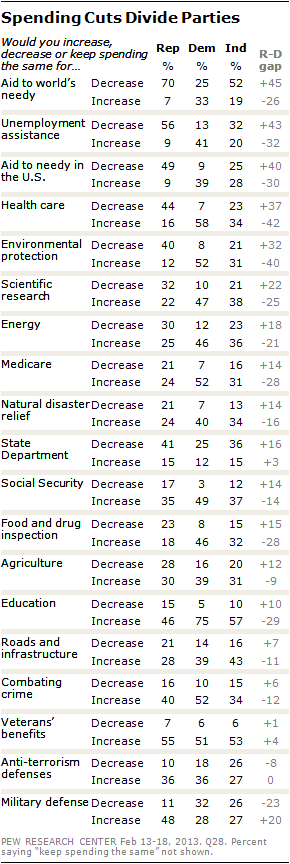Pew Research Center recently asked the public which federal programs they would increase, decrease or keep spending the same for. In 16 of 19 major categories of federal spending surveyed in February, Republicans were more likely than Democrats to support cutting spending. Only in the areas of military and anti-terrorism spending are Democrats more supportive of cuts than Republicans. There are no partisan differences about decreasing funding for veterans’ benefits.

The largest partisan gap — 45-points — is over aid to needy people abroad. Seven-in-ten Republicans (70%) said foreign aid should be decreased, compared with just a quarter (25%) of Democrats.
There were also large gaps when it came to unemployment assistance and aiding the needy in the U.S. A majority (56%) of Republicans would decrease spending on unemployment assistance compared to 13% of Democrats, a 43 -point gap. About half (49%) of Republicans would decrease spending for this purpose compared to 9% of Democrats, a 40-point gap.
By large margins, Democrats also were less supportive of cuts to health care, environmental protection and scientific research. While 44% of Republicans said federal funding for health care should be decreased, just 7% of Democrats agreed (in fact, a majority of Democrats – 58% – say federal spending on health care should be increased).
Conversely, while Republicans were more supportive than Democrats of cutting funding for Medicare, Social Security and food and drug inspection, these remain minority positions within the GOP. More Republicans wanted to increase, rather than decrease, funding for Social Security (35% vs. 17%). And Republicans were as likely to say funding for Medicare should be increased as to say it should be decreased (24% vs. 21%). Read more
